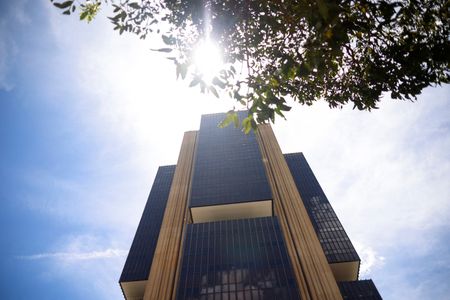 1
1 1
1
By Luana Maria Benedito and Marcela Ayres
SAO PAULO (Reuters) – Brazil’s central bank is poised for its first interest rate cut in three years on Wednesday, with most economists anticipating a small reduction despite government calls for more aggressive action as inflation cools and economic activity loses steam.
After pushing the benchmark rate 1,175 basis points higher to combat pandemic-driven inflation and shocks in energy and food prices, policymakers have held at 13.75% since September 2022, drawing rebukes from President Luiz Inacio Lula da Silva.
Now, the bank’s rate-setting committee is expected to reduce rates by 25 basis points when it concludes its next meeting on Aug. 2, according to 36 of 46 economists polled by Reuters this week.
The other 10 respondents predicted a 50-basis-point cut.
“We believe the initial step will be more cautious, given the ongoing persistence of longer-term inflation dislocation from official targets, elevated core inflation, and the still robust labor market,” said Leonardo Costa, an economist at ASA Investments.
Economists’ views contrast with expectations priced into Brazil’s interest rate curve, which imply a probability of around 60% for a 50-basis-point cut and a 40% chance of a smaller cut.
In the minutes from its last policy meeting, the central bank said a majority of its policymakers saw room for a “parsimonious” rate cut in August if the inflation outlook improved, while a minority supported a more cautious stance.
The release of favorable inflation data has further entrenched differing opinions on the size of the upcoming rate cut, with Finance Minister Fernando Haddad arguing for a more substantial reduction.
Long-term inflation expectations, which have been an explicit concern for the central bank, have fallen since the government decided to keep its annual inflation target at 3% for the coming years. Lula had previously called for higher targets, allowing for looser monetary policy.
Consumer inflation in the 12 months to mid-July slowed to 3.19%, falling short of market projections and dipping below the central bank’s official target of 3.25% for this year, although an uptick is expected due to less favorable baseline effects.
Progress in Congress on new fiscal rules and tax reform have also spurred credit rating agency Fitch to raise Brazil’s sovereign credit rating this week, resulting in the country’s five-year Credit Default Swap (CDS) reaching its lowest level in more than two years.
“There would be conditions for a more aggressive rate cut in August, but the central bank, somewhat divided within its board, is likely to opt for a 25-basis-point reduction,” said Julio Hegedus Netto, chief economist at Mirae Asset.
The bank’s August meeting will be the first to include two of Lula’s nominees to the board. The remaining seven members, including governor Roberto Campos Neto, were chosen by former President Jair Bolsonaro.
All 35 economists who answered an additional question in the poll predicted another rate cut in September, with over 85% betting on a 50-basis-point reduction.
For the end of 2023, the median expectation of 36 respondents is for a benchmark interest rate of 12.00%, and by the end of next year the median projection of 30 economists is for the rate to drop to 9.25%.
(Reporting by Luana Maria Benedito in Sao Paulo and Marcela Ayres in Brasilia; Additional polling by Mumal Rathore in Bengaluru; Editing by Brad Haynes and Conor Humphries)